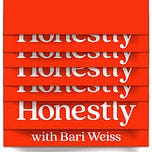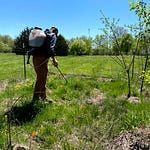This is the weekly-ish newsletter version of Sara by the Season, where I explore a little bit of everything that’s on my mind as I try to lean into nature’s wisdom and rhythms. You can listen to me read you the newsletter by hitting play above - or you can click the little link above and to the right to play in your favorite podcast player. If you know someone who would like this sort of thing, share it!
A few weeks ago, a friend posted about their mom’s birthday. They said kind and thoughtful things, most of which centered around a theme: she puts everyone above herself. I was at a funeral pre-pandemic, and several of the speakers said something similar about the woman who had died: she always put everyone else’s needs first. I googled “she put everyone before herself,” and there were 40,000+ results, most of which were obituaries about women.
I don’t like to should people, but I’m making an exception for this series. We should really stop saying stuff like this. It plays right into the patriarchal playbook. It erases women’s (it’s always women that we say this about) actual needs, desires, hopes, dreams. It diminishes women who have a career they care about outside of serving others. It harms men (or infantilizes them) because care-giving is seen as a uniquely feminine characteristic that “real men” don’t do. It creates this ideal woman that serves everyone else with joy and finds no meaning in life outside of her roles in relationship to others. Spoiler alert: most women can’t live up to this standard.
But also, who wants to?!
I’m still working my way through Sharon Blackie’s If Women Rose Rooted. It is taking awhile because I got sidetracked by going down the rabbit hole of how many stories we’ve lost, especially feminine ones, or stories that we’ve embraced to our own detriment. In the introduction, Blackie writes:
The world which men have made isn’t working. Something needs to change. To change the world, we women need first to change ourselves – and then we need to change the stories we tell about who we are. The stories we’ve been living by for the past few centuries – the stories of male superiority, of progress and growth and domination – don’t serve women and they certainly don’t serve the planet. Stories matter, you see.
If Women Rose Rooted has opened my eyes to the stories we’re swimming in that keep us hamstrung from our full humanity. It also has inspired me to dig into where the cultural stories we tell ourselves come from. This “she put everyone else before herself” story has deep roots. I’ve been trying different ways of researching where it came from, but it is almost like trying to locate the beginnings of the patriarchy.
The agricultural revolution certainly had something to do with the simultaneous beginnings of patriarchy and feminizing care giving, but because I was raised in a Christian home, because America was colonized by Christians and because Christianity is still - by far - America’s largest religious affiliation, I’m particularly curious about what stories Christianity is telling that have gotten us where we are. It is helpful for us Americans to dig into the ways in which Christianity is the water we’re swimming in, whether we practice Christianity or not.
That led me all the way back to John Calvin, the reformation theologian who is largely credited with the idea of the Protestant work ethic and whose ideas influenced many of the Founders, who wrote “There is a great advantage in almost forgetting ourselves and in surely neglecting all selfish aspects; for then only can we try faithfully to devote our attention to God and his commandments” in his book on self-denial.
More recently, in many Christian circles, the “Proverbs 31 woman” gets paraded about as a laundry list of what a virtuous Christian woman should look like (the people that use this to hit women over the heads with never seem to acknowledge that Proverbs is first and foremost a Jewish scripture, not a Christian one). After I had Jasper when I was kind of flailing about for some sense of myself as a new mother, I tried out the women’s group at the church we were attending. I only made it once because the small group leader kept talking about the Proverbs 31 woman. I wanted to ask what she was even talking about, but everyone else was nodding along so I felt silly. I didn’t go back, but a few years later, I read Rachel Held Evans’ thoughts on the Proverbs 31 woman and felt quite vindicated.
Anecdotally, I grew up Catholic, and “selfish” was about the worst name you could call someone - maybe second only to “lazy.” But I don’t think this demonizing of selfishness is baked into Christianity. I think we’ve missed the point - or, more accurately, we have been deliberately misled by the story keepers to keep us powerless and controllable. More plainly, it has worked well for the people in power to keep us elevating women who live up to this ideal because it keeps women small and largely powerless (and perhaps even competing with each other).
Something we reiterate often in our house is the second part of Jesus’ greatest commandment: love your neighbor as yourself. But when we spout this off, it is always accompanied by our own addition to the verse, which is something along the lines of the following: “if you’re doing a crummy job of loving yourself, you’ll love your neighbor in the same way. How well you love yourself determines how well you’re able to love your neighbor - oh and, your neighbors aren’t just humans.” Or as Rabbi Isaac ben Moses Arama says much more succinctly, “all love is measured against the yardstick of self love.”
Jesus himself said that this self love was the second greatest commandment behind love of God (which I would argue is just an expansion of self love), which demonstrates to me that it isn’t the story itself that is rotten, it is how the story has been used, manipulated, and diluted against us that has produced the bad fruit. If we choose to do so, we can go back to the roots of the story and see what fruit comes of this kind of “re-storying,” as Robin Wall Kimmerer calls us to.
The “she put everyone else before herself” is a story that we keep telling about the ideal woman in our culture - and it isn’t a good one. We should talk about women - and men - who are particularly suited to care giving in ways that elevates their acts of care without diminishing themselves. We have to stop saying that someone “puts others above themselves” as if it is a good thing. We have to stop aspiring to it ourselves.
Even though this is a systems problem, it is also one in which we have agency too. We can simply stop saying this about the women in our lives and questioning it when others say it.
Rants and raves
👍 I loved The Anthropocene Reviewed, and I would like to read 100 more books like this. I’ve decided insightful, sometimes funny essay collections like this are perfect bedtime reading. Suggestions?
👍 These kinds of lists aren’t usually all that helpful, but I actually gleaned some good stuff from this article about how to better remember what you’ve read, something I increasingly have trouble with as I get older. Send me all of your tips, please.
👍 This ad for Charles Graham in NC.
👎 The Amazon is losing 200,000 acres a day, and I don’t understand why this isn’t front page news every damn day. The amount of loss is more than we can comprehend.
Stuff worth sharing this week
I’ve had at least two weekly conversations a week for the last six months that mirror almost exactly the quote that leads this must-read piece.
I keep wanting to quit Twitter, but then I find stuff like this thread, which explains so much in so little time that keeps me coming back.
Speaking of stories, this conversation was brilliant:
Seasonal pic of the week
A view of me putting myself first and doing something I enjoy because that has to be a big part of what we’re here to do
Quotable
I’ve seen women insist on cleaning everything in the house before they could sit down to write… and you know it’s a funny thing about housecleaning… it never comes to an end. Perfect way to stop a woman. A woman must be careful to not allow over-responsibility (or over-respectability) to steal her necessary creative rests, riffs, and raptures. She simply must put her foot down and say no to half of what she believes she “should” be doing. Art* is not meant to be created in stolen moments only.
Clarissa Pinkola Estés
*I think Estés would say that we’re all creators, whatever your art might look like.
Cheers to removing “putting others above themselves” from your vocabulary!
Sara

















Share this post